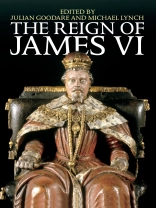The reign of James VI (1567–1625) remains one of the most enigmatic in Scottish history. There are long periods within it that resemble black holes in our knowledge. This study is a concerted attempt by a group of ten scholars of the reign, drawn from three different disciplines, to shed light on its politics and government, viewed through various perspectives. These include the royal court, which is analysed through its literature, architecture and ceremony; noble factionalism; relations with England; a revised model of tensions between church and state; and the relationship between the government and the Highlands, the Borders and the south west, a future region of opposition to Charles I. This study also analyses James as a literary author, correspondent, husband and ‘universal king’.
The book offers alternatives to accepted views of the reign, dismissing both Melvillianism and ‘laissez faire monarchy’ as useful tools. It sees the centre of politics as the interaction between an expanded and increasingly expensive royal court and a phenomenal growth of the state, based on a huge increase in legislation and the business of the Privy Council.
关于作者
Julian Goodare held lectureships at the Universities of Wales, Sheffield and Edinburgh. He is currently Emeritus Professor of History at the University of Edinburgh and is an Associate Editor of the Oxford Dictionary of National Biography. His main research interest is the history of government in Scotland during the sixteenth and seventeenth centuries.
Michael Lynch held lectureships at University College, Bangor, and the University of Edinburgh before becoming Sir William Fraser Professor of Scottish History and Palaeography at the University of Edinburgh from 1993 until his retirement in 2005. His main research interest is the history of the Scottish Reformation. He is a former president of the Society of Antiquaries of Scotland and a former trustee of the National Museum of Scotland.












